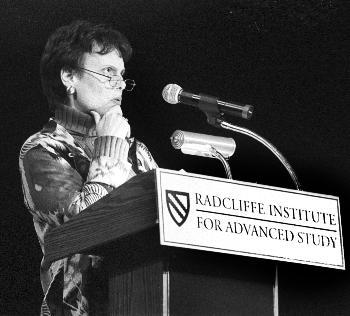
EMILY MANN ’74, a playwright known for her social commentary, reads from her work at the Loeb Drama Center yesterday.
A Harvard graduate who has won recognition for her contribution to documentary theater returned to campus yesterday to read aloud from her plays and explain her writing method.
More than 200 theater fans crowded the Loeb Drama Center to hear Emily Mann ’74, a Tony Award nominee, tell the story of her artistic beginnings in Cambridge and her later Broadway successes.
Mann’s plays tell the stories of ordinary people, often offering social commentary on a particular moment in history.
Mann takes the subjects for her plays from extensive interviews she conducts with interesting people she encounters.
Mann said the inspiration for her first play, Anulla: An Autobiography was her desire as an undergraduate to know her own family history.
This interest led her to receive a grant from Radcliffe for a trip to Europe, where Mann searched for the house where her grandmother once lived in Poland.
Conversations with a Holocaust survivor in Poland, who was the aunt of her best friend, convinced Mann to record the story for the stage.
The play premiered at the Guthrie Theatre in Minneapolis, where Mann would later work as resident director.
Mann read part of the play aloud for the audience, adopting a Polish accent. In the passage, her protagonist spoke about her life before and during World War II and the plight of Jews under Hitler.
Mann described each of her subsequent plays as “a springboard from the play before.”
Her second play, Still Life, developed from a series of interviews Mann conducted with a Vietnam veteran suffering from post-traumatic stress disorder.
The veteran eventually unburdened himself on Mann, describing in horrific detail an incident where he killed a family—husband, wife and children—in cold blood. The story became part of Still Life.
Mann arrived on Broadway with Execution of Justice, set in a polarized San Francisco in 1978. The show details the assassinations of the city’s mayor George Moscone and openly gay city supervisor Harvey Milk, and the riots that followed after the killer was sentenced to only five years in prison.
Mann read an excerpt from the play, contrasting a police officer who decries the moral decay of his town with “Sister Boom Boom,” a gay man dressed as a Catholic nun—both people that Mann interviewed.
Mann’s most famous play, Having Our Say, tells the century-long struggle of the Delaney sisters, two black women born in 1891 and 1893 who fought for equality and acceptance.
Mann continued her exposition of American interracial strife in one of her most recent plays, Greensboro (A Requiem).
Mann said the play centers around a 1979 incident, when the Ku Klux Klan murdered five people who were peacefully protesting the Klan’s activities.
No one, Mann said, has served time for the murders.
As she concluded her lecture, Mann said she remembered her time at Harvard “as if it were a moment ago.”
“So much was given, and happily, even more was expected,” she said.
Read more in News
Conservative Activist Pulls for Permanent Tax Cuts












